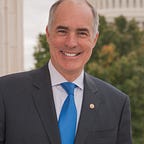Reflections on Floyd, Tulsa & MOVE
A little over a year ago, George Floyd was murdered by a white police officer in Minneapolis, Minnesota. The murder of George Floyd and his last words — “I can’t breathe” — shocked the conscience of this Nation, but for too many Black and Brown Americans, the murder was another reminder of the violence, pain and tragedy inflicted on communities of color every day in the United States. Just this week, President Biden commemorated one of the most horrific examples of racial violence in our Nation’s history — the 100th anniversary of the Tulsa Race Massacre. In 1921, as many as three hundred Black Tulsans were murdered and thousands more were made homeless after a white mob invaded and burned a Black neighborhood in Tulsa — a massacre that was facilitated and perpetrated in part by Tulsa’s predominantly white police department. As we honor and remember George Floyd and those murdered in Tulsa one hundred years ago, we must also have the courage to do what is needed to tear down the barriers that have led to chronic disinvestment, discrimination and violence against our communities of color.
Sherrilyn Ifill, the President and Director-Counsel of the NAACP Legal Defense and Educational Fund, perhaps said it best when she commented that the murder of George Floyd “shamed us before the world.” It compelled many of us — myself included — to reexamine our own understanding of the systemic injustices experienced by communities of color. As a Nation, we have regrettably looked the other way when presented with example after example of our collective failure to live up to our Nation’s founding ideals of freedom and equality for all. Too many of us — particularly those of us with white privilege — have failed to fully confront the white supremacy that permeates our Nation’s history and fueled such atrocities as the Tulsa Race Massacre. We have not been honest with ourselves about the racial injustices that we have permitted and that continue to plague our communities of color.
Just weeks ago, the City of Philadelphia marked its first annual day of remembrance for the MOVE Bombing, which occurred on May 13, 1985. On that date, the Philadelphia police laid siege to a rowhouse on Osage Avenue in an attempt to evict members of the group MOVE from their home. An Inquirer story at the time spoke of the “battlefield at Osage Avenue” and identified the police officers in charge of the operation as the “generals in charge of the little war that had come to West Philadelphia.” The reporters’ use of such militant language was for good reason. After firing 10,000 rounds of ammunition and countless smoke grenades at the home, the city sent a helicopter to drop a bomb on its own citizens.
The bomb ignited a fire on the roof of the rowhouse and it spread quickly to the adjacent homes. With callous disregard for the people in the home and the rest of the community, the city made a strategic decision to let it burn. Flames consumed the block. By the time the blaze was controlled — nearly six hours later — 11 lives were lost, including five children. Multiple city blocks and sixty-one homes were destroyed. Two hundred and fifty people were made homeless. The West Philadelphia community, along with the rest of the City of Philadelphia in the Black communities, were left to grieve alone in the aftermath of the trauma perpetrated by its very own government. I cannot individually recognize each of the hundreds of people victimized by this tragedy, but I can — and we must — honor the Africa family’s children: Tomaso, Delisha, Phil, Netta, and Tree, and the Africa family’s adults: Raymond, Conrad, Frank, John, Rhonda and Theresa, who lost their lives that day.
It took over thirty-five years for the City of Philadelphia to formally apologize for the horror of May 13, 1985. Unfortunately, the apology and the first day of remembrance have been marred by even more disturbing details over the city’s possession and mishandling of the bombing victims’ remains — causing the Africa family to relive the tragedy in a new way and reopening wounds that had never fully healed for the Black community in Philadelphia.
In light of our Nation’s recent reckoning over racial injustice, we cannot reflect on the murder of George Floyd and the conviction of the police officer who killed him without placing them in the long, dark history of discrimination and violence against communities of color — a history that includes the Tulsa Race Massacre and the MOVE Bombing. It is a history which still persists today and compels us to reexamine the systemic injustices in our country. More importantly, it compels us to consider the role we must all play to lessen the burdens that have disproportionately impacted communities of color.
No set of policies will provide a remedy for the many injustices suffered by Black Americans; and for those of us with privileges, simply acknowledging our Nation’s disturbing history cannot fully atone for the past. I hope, however, that confronting the horror of these terrible events will prepare and motivate us for the work ahead. As we move forward, Congress must heed President Biden’s call for June to be a month of action on Capitol Hill. Let us start by honoring George Floyd and passing the George Floyd Justice in Policing Act, but we must also commit ourselves to the work we all must do to tear down the remaining barriers in our society. We must strive to ensure that our Nation’s founding principles of freedom and equality are truly a reality for all Americans.
